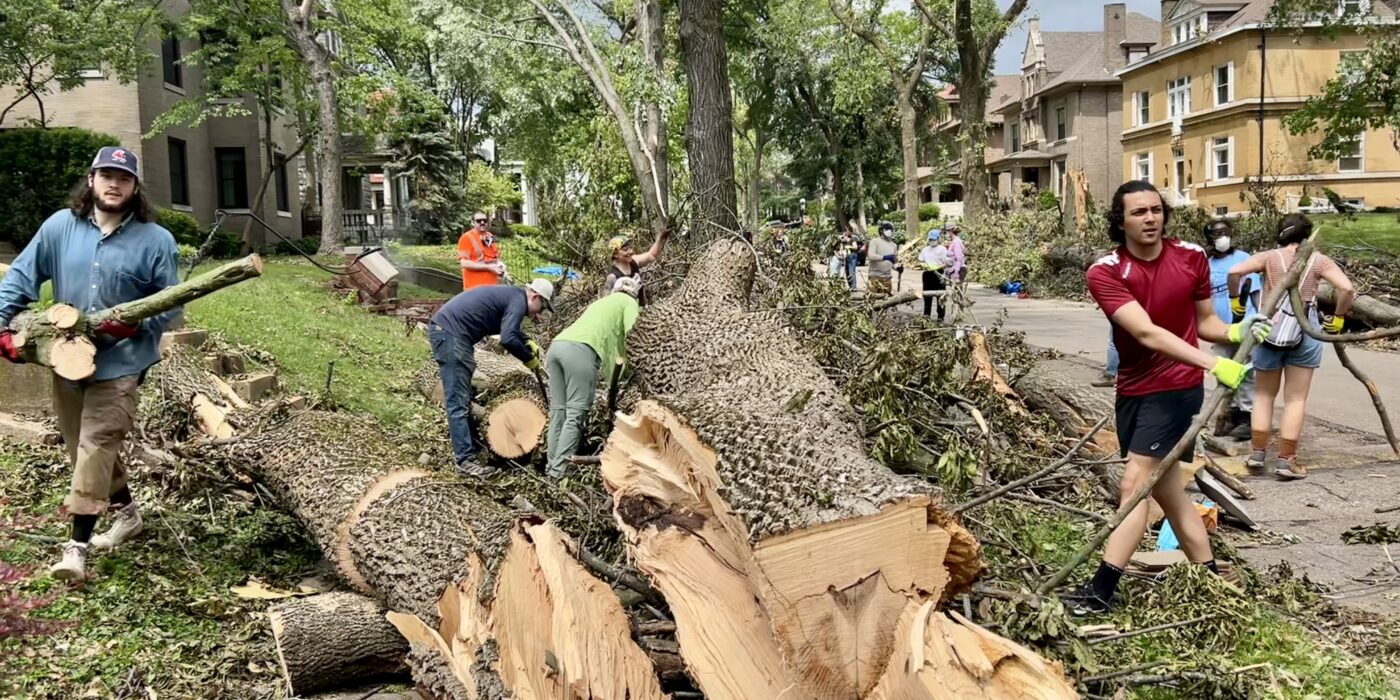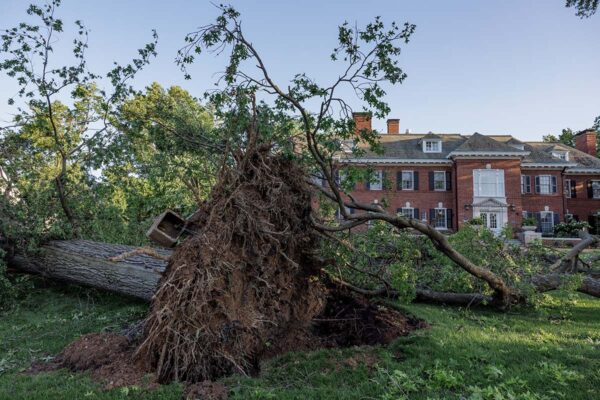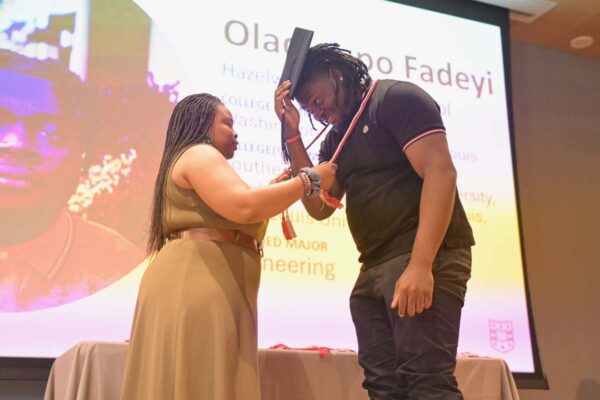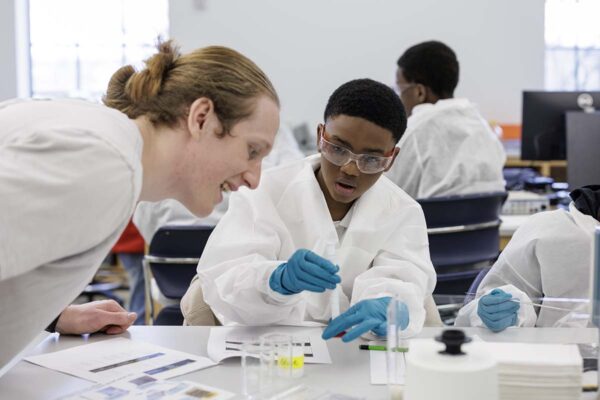The May 16 tornado that devastated parts of the St. Louis region was on the ground for just 24 minutes. The cleanup will take months, maybe years. Several Washington University in St. Louis teams, as well as numerous individual employees and students, have answered the call to help through service and donations — showcasing WashU’s commitment to St. Louis.
Below are some of their stories, working with local nonprofits leading the cleanup effort, and information about how to get involved.
Supporting local nonprofits with ‘boots on the ground’
The most efficient way to get involved in the recovery effort is to volunteer through one of many community organizations, said Lisa Weingarth, senior advisor to the chancellor and executive director of the “In St. Louis, For St. Louis” initiative. Her team is keeping a website updated with opportunities for the WashU community to help.
The United Way Volunteer Center also has opportunities for groups of three or more to volunteer, Weingarth said.
Several university teams have already jumped in to help. In the days immediately after the tornado struck, Weingarth’s “In St. Louis, For St. Louis” initiative team partnered with Delmar Divine nonprofit tenants to clean up the surrounding neighborhoods.
Likewise, on May 20, a team of volunteers from the Brown School, including 12 students, two alumni and four faculty members, joined local relief efforts at the People’s Response Hub, a recovery initiative launched by Action St. Louis and For the Culture STL and based at the YMCA O’Fallon Park Rec Complex. The volunteers were organized by Molly Metzger, a senior lecturer at the Brown School. Read more about their work here.
“Action St. Louis and For the Culture have mobilized hundreds of volunteers to distribute food and supplies to impacted community members and clean up debris throughout the north side. You can drop off donations or volunteer any day of the week,” said Hannah Allee, interim director of the Brown School Evaluation Center.
Volunteers can drop in to help from 10 a.m.-3 p.m. every day at the O’Fallon Park YMCA, Allee said. Donations of water, nonperishable food, heavy-duty trash bags and other supplies also can be dropped off there.
Meanwhile, Heather Hageman, director of the WashU Medicine Community Engagement Hub and the Center for Interprofessional Practice and Education on the Medical Campus, joined several WashU students for an evening packing session for Power4STL, which is home to two programs: St. Louis’ BRIC (Bullet Related Injury Clinic) program and The T, a holistic harm-reduction program.
Stephanie Reynolds, with BRIC, said the organization is trying to be responsive to the community’s evolving needs. The group has temporarily co-located at Fountain Park in north St. Louis, along with other local groups, to distribute food, water and supplies.
“Power4STL is providing mental well-being support and somatic healing, spiritual care, a place for rest, medical care and a charging station,” Reynolds said. People can donate to Power4STL here. Their next monthly volunteer night is June 23.
Matt Bernstine, director of the Sam Fox School’s Office for Socially Engaged Practice (OSEP) and co-director of the Sumner StudioLab, said his office has been volunteering with Invest STL, 4theVille, and Dream Builders 4 Equity at the Info Center on MLK Drive. According to Bernstine, these organizations have self-mobilized and pivoted their operations in a profoundly impactful way to immediately serve the community in-need. He said the office is directing people to volunteer though a form on the OSEP webpage.
‘What we saw reminded me of the entire neighborhoods that were wiped out from the recent Palisades and Eaton Canyon wildfires. It’s not just one house or one church. It’s block after block after block.’
Rachel Cartmell
Other employees and students felt compelled to jump into action after witnessing the storm’s destruction firsthand.
“It’s very, very hard to understand the utter destruction unless you see it with your own eyes,” said Rachel Cartmell, assistant vice chancellor for advancement communications at WashU.
“Photos don’t do it. We moved from the LA area three-plus years ago. We have friends and family there. What we saw reminded me of the entire neighborhoods that were wiped out from the recent Palisades and Eaton Canyon wildfires. It’s not just one house or one church. It’s block after block after block.”
Cartmell volunteered in The Ville and Greater Ville neighborhoods with her husband, Tim, and daughter, Lucia, a nursing student in the School of Continuing & Professional Studies at WashU. Together, they delivered donations, assisted with cleanup and helped coordinate volunteer activities. She hopes other WashU employees and students will volunteer, too.
Elisha Akli, an accountant from Ghana who is pursuing a master’s degree in accounting at WashU’s Olin Business School, also was drawn to volunteer after learning about the damage in north St. Louis on social media.
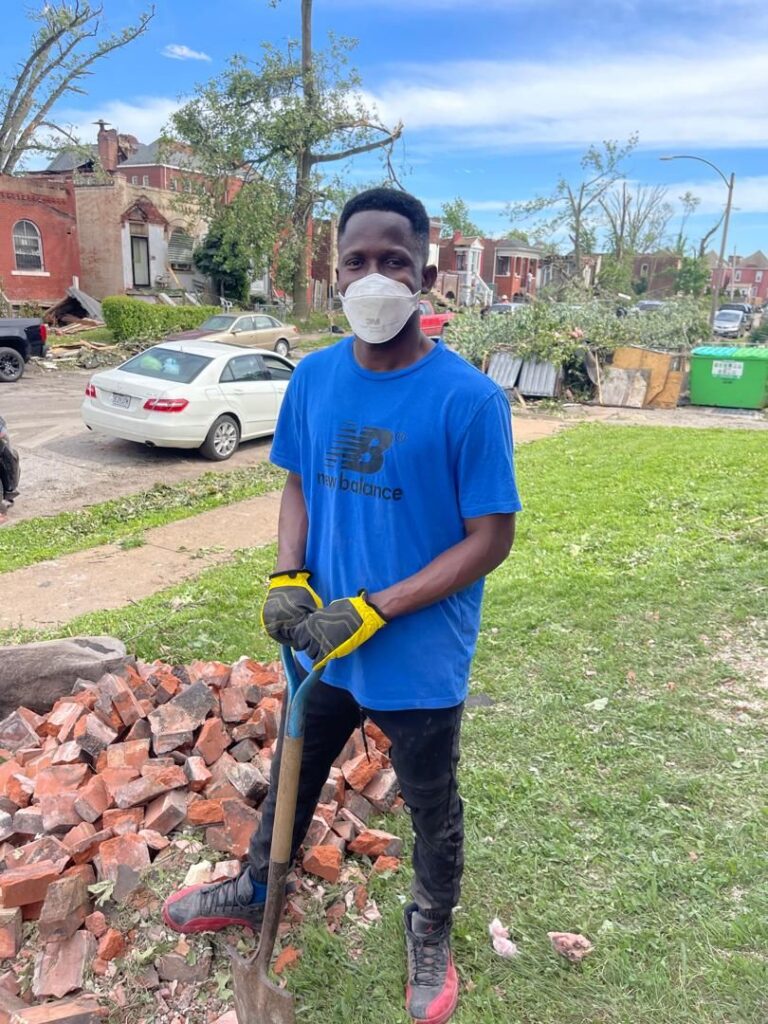
“I came across a post by Mrs. Cheryl Walker — an African American woman who has been incredibly supportive to me and many other international students from Africa since I arrived in the U.S. — showing the damage to some of her properties in north city, a heavily affected area. I immediately reached out to ask how I could help. She responded positively and even picked me up from my apartment so we could volunteer together, joining other organized groups and individuals already working in the area.”
Akli said the experience has left a lasting impact.
“In a world often characterized by division and individualism, it was uplifting to be part of a movement that was selfless, unified and deeply compassionate,” Akli said. “North city is a predominantly Black community, but I saw people from all backgrounds, many of them white, working hand-in-hand to help those affected. There was no discrimination, no racial divide. Just people sharing tools, energy and ideas with one goal: to bring relief and restore hope. It reminded me of the best of humanity — what’s possible when we see each other simply as people in need and people who care.”
Urban League, Red Cross donations
For those who are unable to volunteer, or who want to do more, the WashU Police Department is partnering with the Urban League of Greater St. Louis to collect in-kind donations.
“Everyone has been rallying together to support the St. Louis community that was impacted by the tornado,” said Angela Coonce, chief of the WashU Police Department. “We are making two to three trips per day to drop off truckloads of items that our community has graciously donated.”
The following items can be dropped off at the police station on the Danforth Campus, at 6615 Shepley Dr., which is always open:
General supplies
- Tarps
- Flashlights
- Work gloves
- Batteries
- Duct tape
- Portable charging stations
Food and beverages
- Bottled water
- Gatorade
- Peanut butter
- Canned chicken and tuna
- Canned soups (pop-top)
- Oatmeal
- Crackers
- Trail mix
- Packaged snacks
Infant and hygiene supplies
- Infant formula
- Diapers and wipes
- Toothbrushes
- Soap
- Shampoo
The WashU Medicine Campus Store (MCC, 1st floor) and Danforth Campus Store (ground floor of Mallinckrodt Center) are accepting donations to the St. Louis Area American Red Cross. Students, faculty, staff and visitors are welcome to stop by and make a donation at the point-of-sale system, with or without a campus store purchase. Bear Bucks also are accepted as a form of payment for donations.
For additional opportunities to volunteer and donate, visit the St. Louis government website.
Finally, WashU Human Resources is maintaining a webpage with resources for those affected by the storm. Visit the site for more information, including community support from several local and national organizations.
